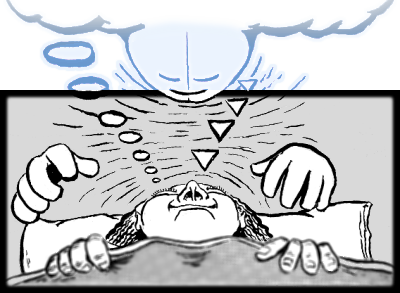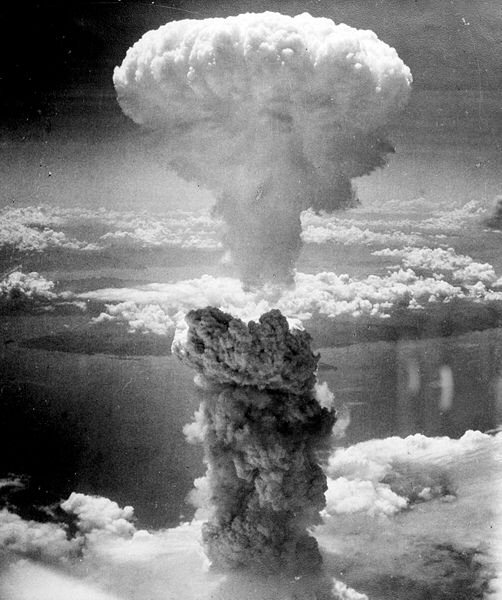Primary tabs
Posts
Posts
All articles from all albums, full content, latest on top,
not including Doodles
not including Doodles
Page 108 of 131, posts 536 - 540 of 655

The season of sleep offers the best opportunity
for the Spirit of God which lives within each of us
to make contact with the mortal mind.
And our dream life is sometimes inspired by this contact.
Click here to read the comic
Spirit Contact and Dreams
Spirit Contact and Dreams
Original Lo-Res version of this page
Hi-Res posters from Spirit Contact & Dreams:
Simple two-chord repetition, e.g. Am-Ab.
1. No war! No war! No war! No war! Ain't gonna go to war no more! O'course it has been said before. After bombing, blood, and gore, The cry goes up from every shore, Ain't gonna go to war no more!
2. Again! Again! Again! Again! We'll raise the arms and rouse the men. But war won't be like that one then. Always will it be worse when We plunge into the dark again, Scheming to kill other men.
3. The Bomb! The Bomb! The Bomb! The Bomb! It could've happened in Viet Nam. One side gets scared, an H-Bomb drops. In twenty minutes, mankind stops. Why not make one planet of.... United man, United Love....
Performed (instrumental) in Mindful Webworkshop #13 - Election 2016, 2016 Nov 4
1.
C
Stop and think for a minute
'Bout this Land of the
Brave and Free
Two hundred years is short
But it's a great democracy
F
They founded a republic
Fm
Built it solidly to last
C
Maybe it's gotten big 'n' slow
But if you look to
the recent past
G
Just like a little baby
F
We've got all that it takes
C
Just like growin' up
We've had to
learn from our mistakes
an' I get those
G
Red 'n' White Blues when they
F C
keep puttin' my country down
2.
C
Now we don't have Richard Nixon
To kick us around no more
And we made a special effort
To end up Viet Nam's war
F
And we just quit helpin' Mexico
Fm
to paraquat the grass
C
So Khomeni can take his beads an'
shove 'em up...
(let's not be crass)
G
I know we've still got problems
F
And perhaps they've just begun
C
But at least we've learned
that freedom doesn't
come out of a gun
an' I get those
G
Red 'n' White Blues when they
F C
keep puttin' my country down
Mindful Webworks / Radical Incline / Red 'n' White Blues, page 2
3.
C
I can't defend the stupid things
Like a country of our size
Still being too proud and too narrow-minded
To simply apologize
F
We can't even run our own place
Fm
'cause we're so busy splitting hairs
C
If we'd mind our own damn business
We would not be minding theirs
G
But the way that we've been treated
F
Is stickin' in my craw
C
Khomeni wouldn't be around
if we'd really
been helping the Shah
an' I get those
G
Red 'n' White Blues 'cause they
F C
keep puttin' my country down
4.
C
Some folks don't trust the Black man
And some folks fear the Gay
Some folks don't like Disco
But they trust the C.I.A.
F
I'm not pointin' any fingers or
Fm
Tryin' to tell you how to be
C
It's a great big blessed country
And there's room for you and me
G
And besides the earth is nuclear now
F
Not like it was before
C
This could be the final chapter
one more war
will end all war
and end my...
G
Red 'n' White Blues 'cause we
F C
wouldn't have no country around....
Performed in Mindful Webworkshop #13 - Election 2016, 2016 Nov 4
With a marching beat
1.
E
Whatcha gonna do about it,
Whatcha gonna do,
When the army of America
D
is comin' after you?
D
Whatcha gonna do about it,
Whatcha gonna say,
When people from the draft board
E
try to send you far away?
2.
E
Whatcha gonna think about it,
How you gonna feel,
When they argue that your draft
D
resistance simply isn't real?
D
Whatcha gonna do about it,
Where you gonna go,
If Canada won't take you
E
and the prisons overflow?
3.
E
Wouldja fight in Israel
Or go defend Iran,
Or some supposed vital interest
D
in Afghanistan?
D
Deadly germs and killer gas
And anti-matter ray,
Giant solar microwaves
E
and mutant DNA...
4.
E
We can fire lazer beams
And drop a neutron bomb,
All the weapons that we didn't
D
have for Viet Nam.
D
Each war they say is diff'rent
But the people die the same.
Next time they give a war
they'll say that
C B E
everybody came!

Performed in Mindful Webworkshop #13 - Election 2016, 2016 Nov 4
1.
Gm F7 C7
Goes down so easy but it burns so bad
Gm F7 C7
Goes down so easy but it burns so bad
Gm F7 C7 F7
Goes down so easy but it burns so bad
Cm Eb7 Gm
Rots a soul from inside
2.
Gm F7 C7
Give me lovin' like I never had
Gm F7 C7
Give me lovin' like I never had
Gm F7 C7 F7
Give me lovin' like I never had
Cm Eb7 Gm
Leave me no place to hide
Performed in Mindful Webworkshop #5



